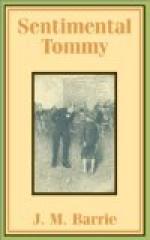“My head against a buckie that he could! Sit down, Grizel, I see what you mean now. Ay, but the pity is he’s not eligible for the Hugh Blackadder. Oh, that he was, oh, that he was! It would make Ogilvy of Glenquharity sing small at last! His loons have carried the Blackadder for the last seven years without a break. The Hugh Blackadder Mortification, the bequest is called, and, ’deed, it has been a sore mortification to me!”
Calming down, he told her the story of the bequest. Hugh Blackadder was a Thrums man who made a fortune in America, and bequeathed the interest of three hundred pounds of it to be competed for yearly by the youth of his native place. He had grown fond of Thrums and all its ways over there, and left directions that the prize should be given for the best essay in the Scots tongue, the ministers of the town and glens to be the judges, the competitors to be boys who were going to college, but had not without it the wherewithal to support themselves. The ministers took this to mean that those who carried small bursaries were eligible, and indeed it had usually gone to a bursar.
“Sentimental Tommy would not have been able to compete if he had got a bursary,” Mr. Cathro explained, “because however small it was Mr. McLean meant to double it; and he can’t compete without it, for McLean refuses to help him now (he was here an hour since, saying the laddie was obviously hopeless), so I never thought of entering Tommy for the Blackadder. No, it will go to Ogilvy’s Lauchlan McLauchlan, who is a twelve-pounder, and, as there can be no competitors, he’ll get it without the trouble of coming back to write the essay.”
“But suppose Mr. McLean were willing to do what he promised if Tommy won the Blackadder?”
“It’s useless to appeal to McLean. He’s hard set against the laddie now and washes his hands of him, saying that Aaron Latta is right after all. He may soften, and get Tommy into a trade to save him from the herding, but send him to college he won’t, and indeed he’s right, the laddie’s a fool.”
“Not at writing let—”
“And what is the effect of his letter-writing, but to make me ridiculous? Me! I wonder you can expect me to move a finger for him, he has been my torment ever since his inscrutable face appeared at my door.”
“Never mind him,” said Grizel, cunningly. “But think what a triumph it would be to you if your boy beat Mr. Ogilvy’s.”
The Dominie rose in his excitement and slammed the table, “My certie, lassie, but it would!” he cried, “Ogilvy looks on the Blackadder as his perquisite, and he’s surer of it than ever this year. And there’s no doubt but Tommy would carry it. My head to a buckie preen he would carry it, and then, oh, for a sight of Ogilvy’s face, oh, for—” He broke off abruptly. “But what’s the good of thinking of it?” he said, dolefully, “Mr. McLean’s a firm man when he makes up his mind.”




